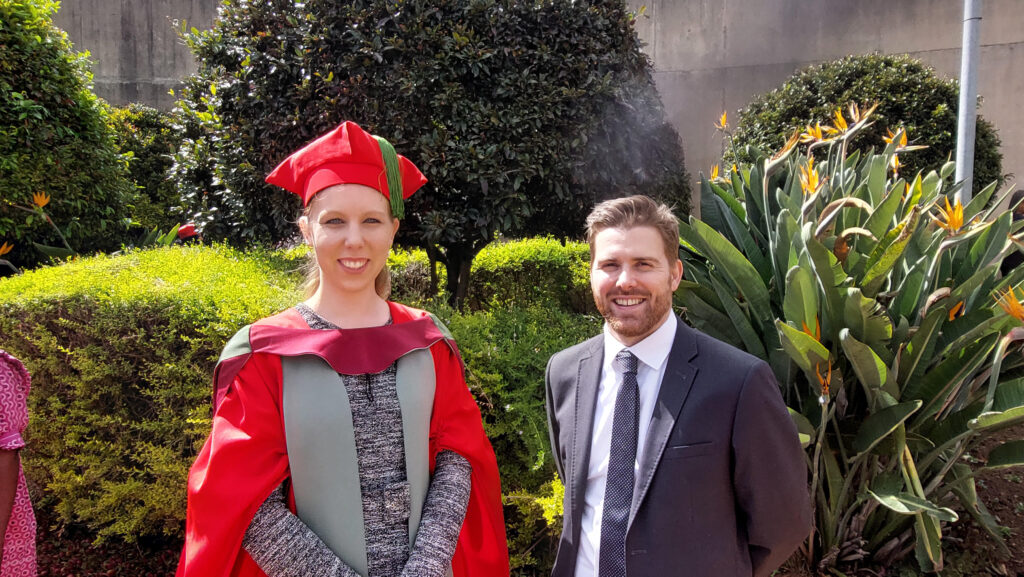
at the University of Pretoria’s autumn graduation ceremony in 2024
Dr Charissa Button has made history by becoming the University of Pretoria’s (UP, one of IDIA’s partner Universities) first PhD graduate in Astrophysics (capped during the University’s autumn graduation ceremonies). During Dr Button’s PhD research, she made use of IDIA infrastructure and MeerKAT data to study how gravitational lensing can be used as an approach to probe the more distant universe.
“I am excited to see UP growing in astronomy, especially as the Square Kilometre Array (SKA) and MeerKAT are such important, high-profile international projects,” said Dr Button of the two projects in which UP is involved. “I am honoured that my PhD constitutes a milestone in developing UP’s astronomy programme. I look forward to continuing to contribute to its development as an early-career researcher.”
Dr Button completed her degree under the supervision of Professor Roger Deane, who established UP’s Radio Astronomy Research Group in 2018. Prof Deane now serves as an Extraordinary Professor in the Department of Physics in the Faculty of Natural and Agricultural Sciences, and is the Department of Science and Innovation/National Research Foundation SARChI SKA Chair in Radio Astronomy at the University of the Witwatersrand.
“Dr Button’s PhD is an excellent example of how a bright young mind can use the power of smart algorithms and big data to make new important cosmic discoveries with next-generation telescopes like the Square Kilometre Array,” Prof Deane says. “I’m excited that we’ll soon be able to test her predictions with the SKA, building on a strong foundation of experience with MeerKAT.”
Dr Button first became interested in pursuing postgraduate studies in radio astronomy because of its unique perspective in exploring several fundamental questions in physics, such as the nature and effects of dark matter, and the expansion of the universe.
“In my PhD, I explore gravitational lensing as an approach to probe the more distant universe. Gravitational lensing, which Einstein predicted in his general theory of relativity, arises when a massive object, like a galaxy, lying in the foreground of a more distant galaxy, bends the light rays from the distant galaxy (like a raindrop on a window), thereby amplifying the signal of the distant galaxy that would otherwise be too faint to detect with current instruments. My thesis explored methods for finding gravitationally lensed HI sources and OHMs in upcoming SKA surveys, which will significantly increase their scientific yield.”
Dr Button would like to continue her research in exploring galaxies in the distant universe with gravitational lensing.
“My position as a postdoctoral fellow at UP will enable me to do so,” she says. “I aim to build on international collaborations developed during my PhD with the Universities of Oxford and Western Australia as I pursue a broader research portfolio. UP’s membership of IDIA has facilitated such partnerships, in addition to the high-performance computing and expert software support that made my computationally intensive PhD results feasible on a three-year timescale.”
Dr Button did her PhD full-time thanks to funding from the South African Radio Astronomy Observatory (SARAO); she is now a SARAO postdoctoral fellow at UP.
“It is exciting for a new research group like the Radio Astronomy group to reach this milestone, having been built from the ground up and now seeing the fruits of that investment after many years of work,” said Prof Chris Theron, Head of the Department of Physics. “Dr Button joining the Department of Physics as a SARAO postdoctoral research fellow, after having done her undergraduate degree here, is a proud moment for the department and a significant step for radio astronomy’s continued growth and success.”
